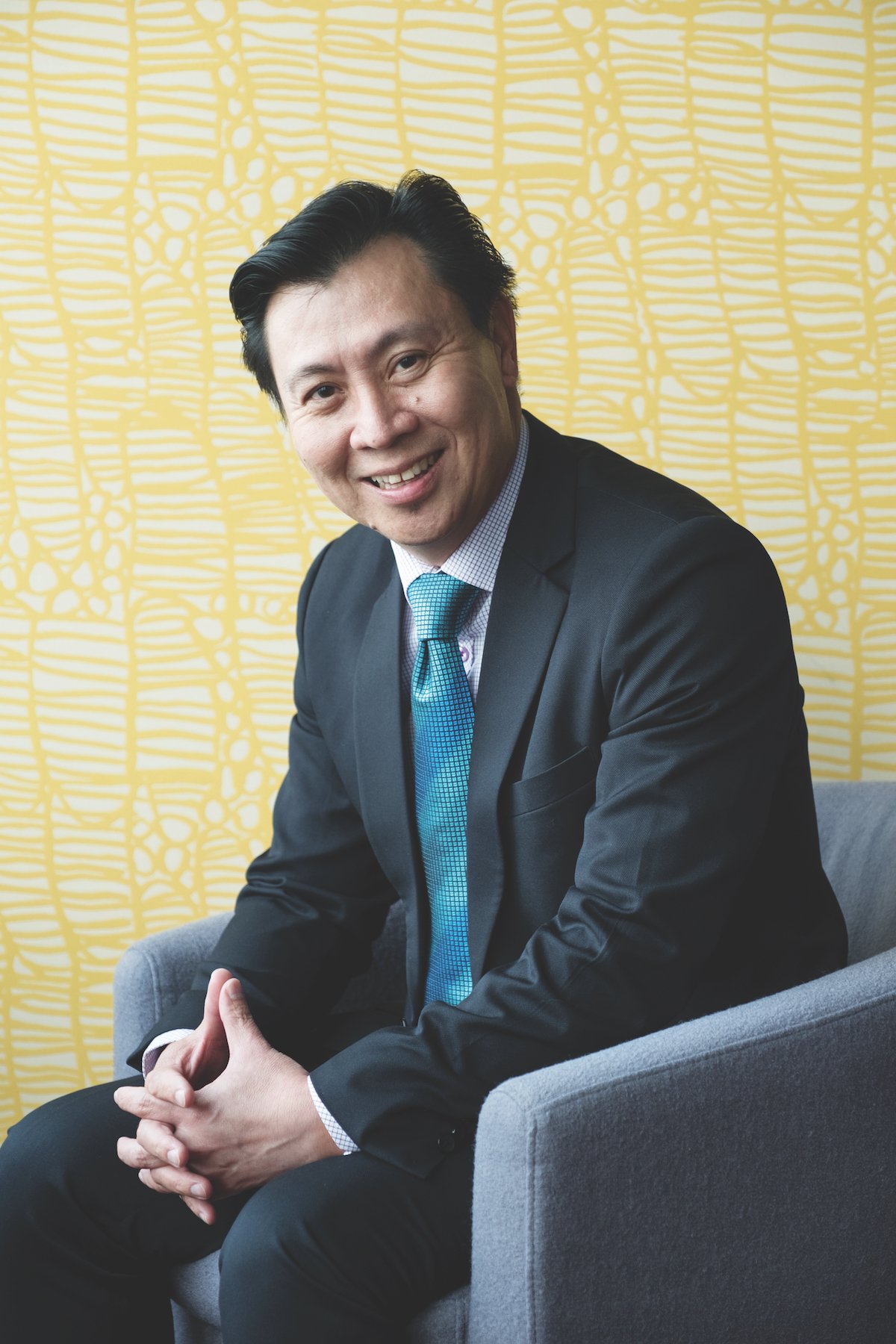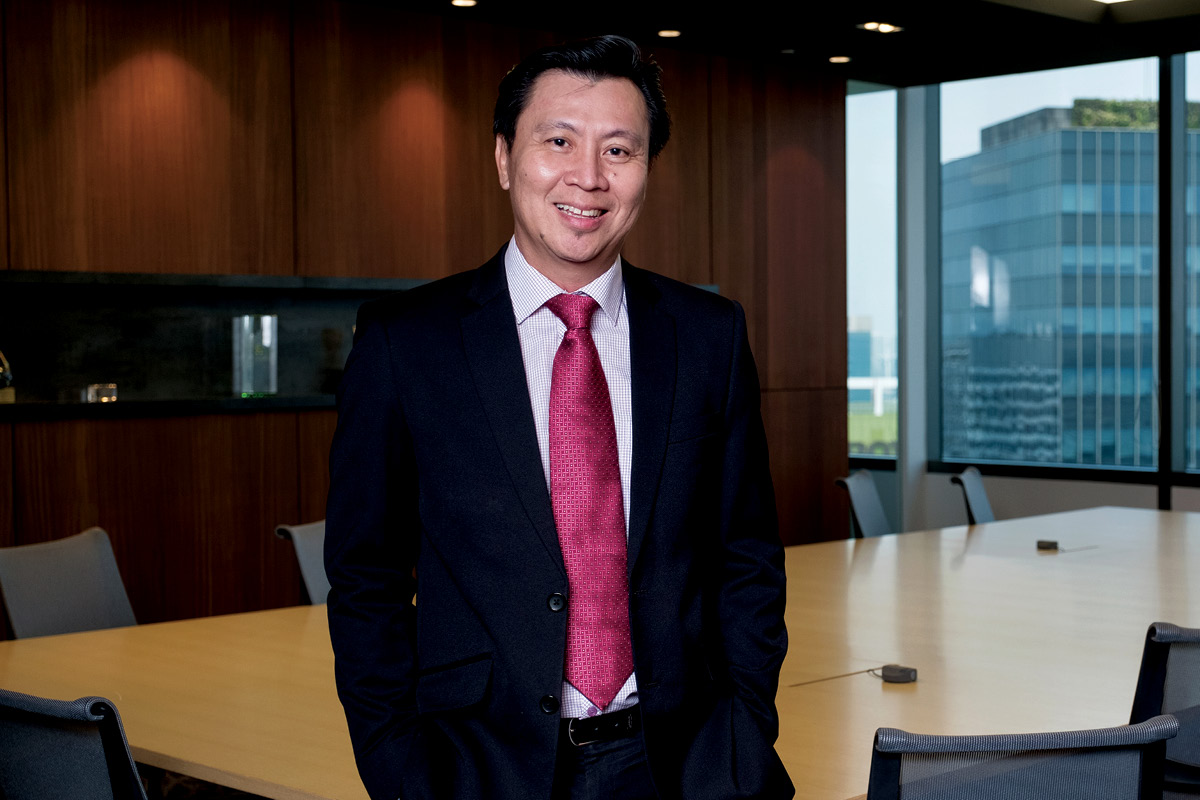After 20 years rising through the ranks of New Zealand engineering consulting firm Beca – first as an engineer and then in project delivery and as General Manager in Singapore – Lee Ang Seng was made a Managing Director in 2013 and given the reinsof both the Singapore and Myanmar businesses.
As for the two countries, they couldn’t provide a more stark contrast in terms of their respective economic development. On one hand, Singapore is one of the four Asian Tigers, the others being Hong Kong, South Korea and Taiwan. Meanwhile, Myanmar is just beginning to open its economic borders following a slow transition to democracy for the country.
Ang Seng is well aware of the unique opportunities and hurdles that both Singapore and Myanmar bring. But regardless of which country he’s handling, his approach to managing people is essentially the same. “I run these two countries and regard them as one company,” he says.
Further, Ang Seng is also pioneering an ‘emerging leaders’ program, aimed at young engineers with high leadership potential. The aim is to prepare them for elevation into leadership positions within Beca. The CEO Magazine sat down with Ang Seng to find out how he successfully juggles the business of two countries at very different stages of growth.
The CEO Magazine: Tell us more about Beca’s presence in both the Singapore and Myanmar markets.
Ang Seng: In Singapore and Myanmar, we focus primarily on buildings. In Singapore, we are regarded by some architects and clients as one of the top three engineering consulting firms. I dare to say one of the top three because of the number of large projects we have undertaken, since by size we are not the largest.
Obviously, Singapore is a very developed country. But because of the property cooling measures that were put in place by the government, development in the private sector has slowed down significantly over the past three to four years. However, the government has been developing lots of infrastructure projects, institutions and buildings, and that helps the built environment industry.

Over the past two years, our focus has been on doing public sector projects. We have other private sector projects for some of the hotels and so on, but the main part of our work is focused on government projects. In Myanmar we are quite small, a team of about 40 people.
We set up the Myanmar operation more than 10 years ago, pretty much like a low-cost production centre. Since last year, we have begun to upscale the office to train our team to become engineers.
One of the initiatives we’ve got is to transfer people from Myanmar to Singapore for one to two years, or even longer, and then we send them back again, so that they become well-equipped engineers and can lead their team locally in Myanmar. Now, I have a Country Manager based in Myanmar who looks after the operations and talks to me directly.
What has it been like working in Myanmar? The country itself has had quite an eventful history.
That’s right, it has only opened up in the past two years with the Aung San Suu Kyi-led government. They are beginning to put regulatory systems in place for standards and consistencies. For example, in the building space, they are putting more procedures and systems in place.
The country is still quite backwards in terms of development with weak infrastructure. But being an emerging market, Myanmar attracts lots of interest from investors who are keen to put their money there to build new infrastructure and buildings. In recent times, we have been involved in designing a Grade A office tower. There aren’t many in Myanmar but we are building one there now.
It is encouraging that Myanmar is finally developing as a nation. Do you worry that the situation in Rakhine might deteriorate and regress?
I’m not too concerned, but I do have to keep a close eye on the situation. The current unrest in Rakhine State involving the Rohingyas is rather unfortunate. But in cities like Yangon, it is very much business as usual with development of new buildings. If you go to Yangon now, you will see high-end shopping malls open for business. Ten years ago, you would not have seen such buildings.
If you go to Yangon now, you will see high-end shopping malls open for business. Ten years ago, you would not have seen such buildings.
I’m very confident that Myanmar will continue to progress well as a country even though it’s not as fast as we would like. I know that some Chinese investors are going into the country to invest in building high-rise buildings.
How are you able to juggle the needs of two markets at sharply contrasting stages of their economic development?
Internally, I’m respectful of the different cultures and practices, but in terms of knowledge transfer and equipping people, I regard the two countries as one. What that means is that we send the good Myanmar engineers to Singapore and let them work there for a period of time (a few years) to gain engineering knowledge and skills.

These engineers get involved in projects in Singapore working alongside their Singapore colleagues. We let them learn skills and equip them with knowledge, so when they return to their own land with their families, they can make an impact on the technical development of the Myanmar office to elevate the level of capabilities. We called this a staff transfer scheme to help us do that effectively and successfully.
In Beca, we share work within our offices around the world. Take our Thailand office as an example. They don’t report to me directly, but we collaborate and work with our Thai counterparts very closely on a project in Sri Lanka – the Singapore–Thailand Beca offices work as a team to deliver the project there successfully.
What has your journey been like rising through the engineering ranks?
I graduated from the Singapore Polytechnic with a Diploma in Electrical Engineering. This was in 1988. Then I went on to the National University of Ireland where I completed a Bachelor of Science (Honours) in Management.
After that, I started working for a local mechanical and electrical engineering consulting firm in Singapore, which was about 30-people strong. I was there for three and a half years. Then I switched to become a resident engineer on a project for a contract of 10 months.
The Consulting Engineer of that project, Beca, offered me a position as an engineer in 1993 after my contract ended, and I’ve been with them ever since. Four years ago, I was appointed Managing Director of the Beca Asia hub operations.
But last year, there was a change in our group structure, which transitioned our business from a hub-based focus to a country and market focus. With this group restructuring, I took on the appointment as Managing Director of Singapore and Myanmar.
Do you still remember the first project you did for Beca when you joined?
I was involved in several projects as electrical engineer when I first joined Beca. The first was a large residential project consisting of more than 600 condominium units. Other projects included hotels and a shopping mall in Orchard. As I progressed in my career path in Beca, I was involved in leading large major projects both in Singapore and overseas.
What made you want to change your career focus from engineering to a role more based around business management?
I’m a very people-focused person. I love influencing others; to motivate them towards excellence and career development. I therefore took a management degree to gain more knowledge and understanding of what a good leader of managers should be like within an organisation.
In an engineering consulting firm like us, I believe we need to have a balance of technically competent engineers as well as those who are competent in business management and leadership skills.
I started doing my diploma in electrical engineering in Singapore Polytechnic, the first polytechnic school in the country. My focus then was in engineering, but after graduating I felt that I wanted to go into a management role rather than an engineering one. I didn’t continue with pursuing an engineering degree because I felt I was more naturally inclined towards business and people management.
I guess I have a deep sense of self-awareness, if you may say, of what I’m good at and what I am not as good at. That’s why I pursued a management degree instead.
How do you define what it means to be a leader?
A leader isn’t really one if he or she doesn’t command the respect and trust of the people who look up to him or her. I also believe that a good leader must always be on the lookout to uncover the potential of individuals and to know what people’s strengths and weaknesses are.
The key is to put them in the space where their highest potential can be further developed and to minimise the exposure of putting them where they will struggle to succeed. This has been my principle when I work with people and can apply even in assigning people to different projects.
I also believe that a leader can only be as strong as their people. Hence, the key is to develop ‘strong shoulders’ that the leader can stand on. If the shoulders are not strong, then the leader’s position can be quite shaky and they won’t enjoy their role as leader. So the key to success as a leader is about developing people so that they provide the strong shoulders for the leader to lead. I have experienced this in my progression to
a leadership role at Beca.
Recently, I’ve begun investing in a group of our young people with high potential by enrolling them in an emerging leaders program. Together with my leadership team in Singapore, we identified 12 of them in Singapore and we put them through a two-year emerging leaders program.
After the first session, this program was so well-accepted that we have now extended
the program to our offices in Indonesia and Thailand. Each of these offices has since sent two people to participate in the program. A good leader must always think about developing and grooming our future generation of leaders for our business.
Tell us more about this leadership program that you’re pioneering in Beca.
Pretty much all of the people in the program are quite young and in their late twenties or early thirties. They are required to attend a fully sponsored two-day course every quarter.
The modules in the course include sessions requiring active engagement of the participants in role play of several core leadership skills. For example, emotional intelligence is addressed in the first module. Participants were tasked to discover self-management skills through the role play.
In subsequent modules, they will also learn influencing skills and the skill of negotiation, and what it takes to lead a high-performing team. The interval between these sessions provides these leaders the opportunity to apply what they have learned in the program and put it into practice in the real world. I believe this is a quick way to reinforce the learning experiences.
We are hoping that at the end of the two years, which will be by the first quarter of 2019, we will be able to elevate most, if not all, of these emerging leaders into leadership positions.
Development program aside, I would like to see every engineer I hire into my firm find fulfilment in a meaningful career with Beca. I want to uncover their potential. My leadership team and I have the responsibility to provide opportunities for them, but it’s up to each individual to work towards progressing the path of reaching their full potential.
Is this a cycle that you’ll keep repeating after the current batch of leaders come through?
Yes, I will. I have presented this program to my Asia board and they are very supportive of it. After the current batch have graduated, we will identify another batch whom we’ll develop for the next couple of years. This process will be repeated until we can find other means of developing our people.
Quite often when someone rises to the top of an organisation, they’ll just stay there with no future plan. How important is succession planning in business?
I think that’s a good question. Apart from the emerging leaders program which I talked about, I have other initiatives that I’ve put forward to my group’s HR to assist me
in terms of developing a succession plan for my role as managing director.
I believe in leadership succession in a sustainable business, and so, I need to have a plan to find successors who will one day, when I move on to other roles, take on my position and bring the business to another level of excellence and success.
Leadership succession is not just at my level. In Beca, for example, below me are the Operations Managers, below them are the Section Managers and below them are the Team Leaders. So you can see that we have quite a hierarchy. These are the positions that would require succession plans, in putting people into these positions whom we think can contribute and excel effectively as a leader.
Succession plans may not be immediate but at least the plans should be put in place so that, in times to come, another group of people will be able to move into those roles. If an organisation keeps doing that, I believe they will retain their key people, the business will stay strong and relevant, and continue to do well in the market.
I’ve found with some of the local engineering consulting firms here that, once their founder has retired, the business dies with them, or somebody purchases the business so their brand will no longer be around, which is something I find really sad.
But if an organisation is prepared to invest in people and looks at succession, the company will continue for ages, because you have a plan in place to continue bringing in people to breathe life into and lead the business. That is what I like to see.
You’ve been involved in many projects throughout your career. Are there any that you’re most proud of?
Well, I must say that my most memorable project is the Republic Polytechnic Campus. It won the President’s Design Award in 2006. I was the Director in charge of the project and Beca was involved in the Mechanical and Electrical disciplines.
It was considered one of the largest projects at that time, and we had both local and foreign architects and engineers working very well together. So that’s one project that I find personally very satisfying.
The other one is obviously the Universal Studio project at Resorts World. That was exciting because it was the first Universal Studio theme park in South East Asia.
With theme parks, the input we have to put into the project is quite different from what we would do with typical buildings. I was leading a team in developing the project towards a good outcome under very trying and challenging conditions.
How do you see your business developing over the medium term?
Over the next five years, I’d like to see growth in our business by at least 10% every year. That would be my ambition. I would like to see my business expand geographically as well. I want Beca to get more involved in projects in countries such as Vietnam, Sri Lanka and the Philippines.
I also want to reach new industries. In Singapore, we want to increase our market share on projects in health care, education, airports and commercial office space, as well as hospitality through hotels.



